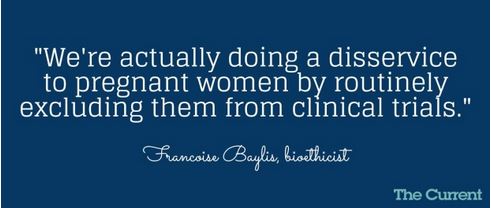Research with Pregnant Women
Recent News
Revised CIOMS guidelines were recently published (update from 2002 version). NTE members contributed (see above) as part of the open call for recommendations in the lead up to final publication (2016).
Overview
While great strides have been made in recent history with respect to the inclusion of women and children in clinical trials, pregnant women are often routinely excluded. Pregnant women and their fetuses require safe, effective, evidence-based treatment. Excluding them from clinical trials forces their physicians to either withhold treatment or prescribe drugs “off-label”, without the benefit of clinical data to verify safe, effective and appropriate dosages for pregnant women and their fetuses.
This occurs despite guidelines promulgated by the Council for International Organizations of Medical Sciences (CIOMS) which clearly state that pregnant women should be included in research. Article 4.3 of the Tri-Council Policy Statement [PDF - 1.7 MB] also states that women should not be excluded from research simply because they are pregnant or breastfeeding.
Françoise Baylis argued before the Senate Committee in May 2012 [PDF - 106 KB], "pregnant women get sick and sick women get pregnant", and they should be entitled to the same level of evidence-based healthcare as other individuals. Her concerns were noted in Canada's Clinical Trial Infrastructure: A Prescription for Improved Access To New Medicines (page 16) [PDF - 1.5 MB], and also in Prescription Pharmaceuticals in Canada: Post-Approval Monitoring of Safety and Effectiveness (page 23) [PDF - 4.4 MB].
Françoise Baylis is co-editor with Angela Ballantyne of Clinical Research Involving Pregnant Women: Missed Trials (Springer, 2016).
The debate has been heard in conference presentations, the media and academic journals:
- Pregnant Women and Health Research: An Ethical Imperative [PDF - 2.8 MB]
Françoise Baylis, presentation at Queen's University, May 7, 2013. - The Controversy Surrounding Antidepressants and Pregnancy
Anne Kingston, Macleans, April 29, 2013. - Research Involving Pregnant Women: Trials and Tribulations [PDF - 1.8 MB]
Françoise Baylis and Scott Halperin, Clinical Investigation, 2012, 2(2),139-146. - The Common Rule, Pregnant Women, and Research: No Need to "Rescue" That Which Should be Revised
Chris Kaposy and Françoise Baylis, The American Journal of Bioethics, 2011, 11(5): 60-62. - Why Pregnant Women Deserve Drug Trials
Melinda Wenner Moyer, Body Politic, January 6, 2011.
Last updated September 2017.


